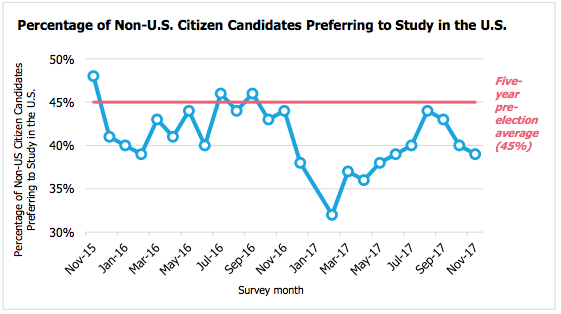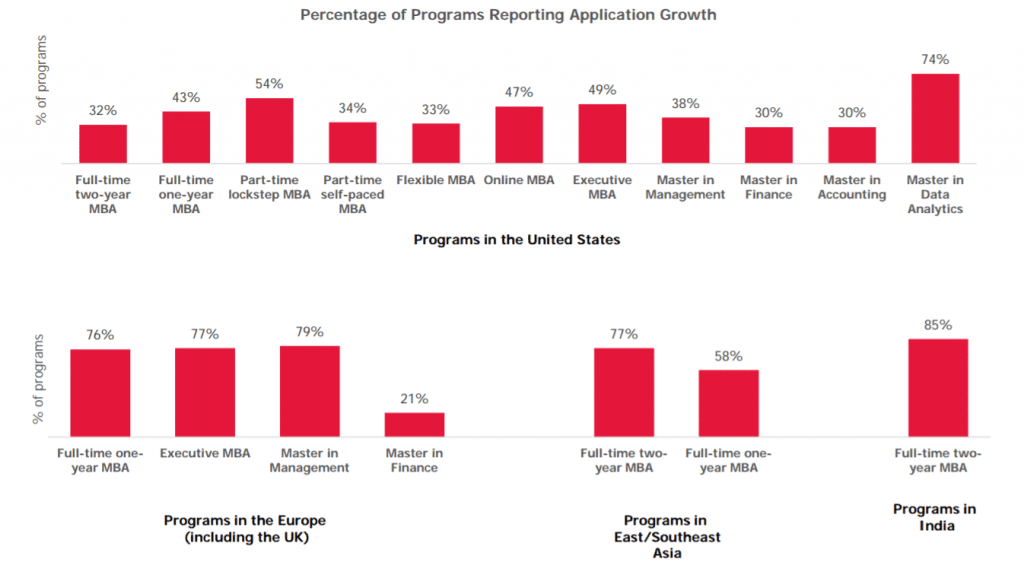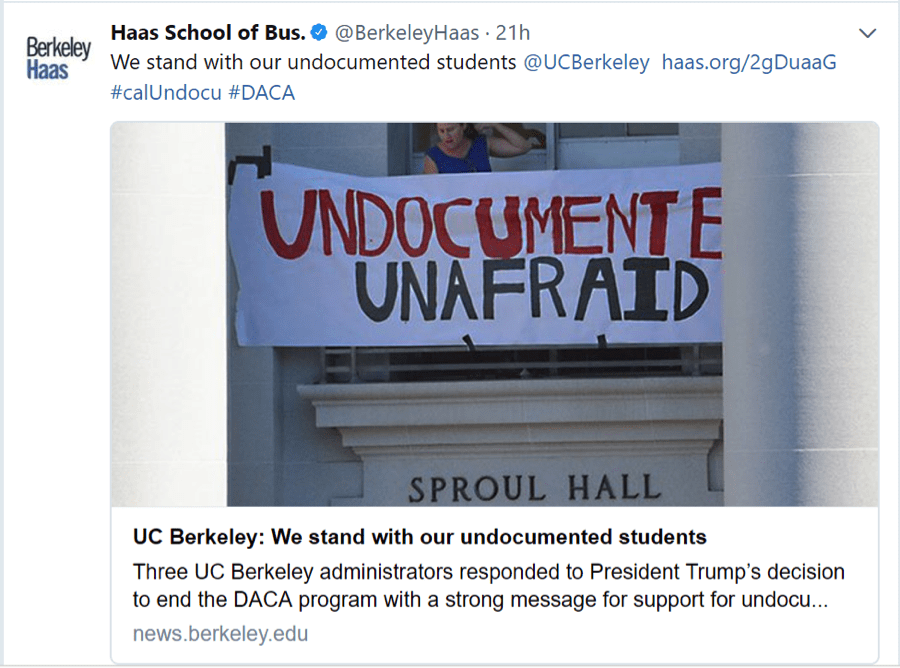More Harvard MBAs Are Turning to Politics

There’s no doubt that politics and public service have been hot topics since the November 2016 election. These subjects have dominated news stories and talk shows across the country. And, according to a recent report by the Wall Street Journal, politics and public service are also moving up as career choices for graduates from Harvard Business School (HBS).
Around 40 Class of ’17 HBS MBA graduates launched careers in government and nonprofits—twice as many as the previous year. Even though this represents just 4 percent of the program’s 900 graduates, it still suggests a growing interest in policy-making for business students.
Of course, business and government have always been closely connected, and it’s common for MBA students to aspire to public service and nonprofit involvement as part of their long-term career plans. The difference is that MBA graduates are starting to head into public service careers immediately after graduation. At least that’s what Matthew M. Segneri, an HBS MBA Class of 2004 alumnus, has witnessed.
Segneri, the director of the Social Enterprise Initiative at HBS, has noticed that graduates are increasingly considering careers in politics. In an article in the Harvard Crimson, he said: “Over the last 12 to 18 months, I’ve had a number of conversations with folks and seen a real uptick in the number of people who are thinking about local, state, and federal office.”
He went on to observe a change in the timing of these plans. “When you look at the prior generations of alumni there is more the tradition of learn, earn, and return—folks would go to school, have a successful traditional business career, and then later in life they would pursue public office or get deeply engaged in nonprofits and their communities,” Segneri said. “Today, there’s both an urgency and an understanding that it doesn’t have to be that way.”
There are many factors driving the surge in interest in politics. One is the simple fact that the United States elected a prominent businessman as president in the last election. Another is a trend of prominent business leaders being very vocal about politics in recent months, reinforcing the connection between the business and political realms.
For example, during the 2016 November election, Meg Whitman, the CEO of Hewlett Packard Enterprise Co., threw her support behind the Democratic candidate in New Jersey’s Fifth Congressional District race. And Carlos Diaz, a French entrepreneur in Silicon Valley, told the Financial Times that the tech industry has some responsibility for the 2016 election outcome.
YOU MAY ALSO LIKE: MBA Alumni Spotlight: HP CEO Meg Whitman
“The America that voted for Trump does not own a Tesla, nor an iPhone, and when it needs money, it does not ask business angels for help: it relies on bad credit,” Diaz said. “It is time to recognize that we need to develop technologies and businesses that will benefit the widest range of people possible, algorithms that do not divide but that bring together.”
So, it’s not a surprise that MBA graduates are heading into politics. In fact, more than a dozen Harvard MBA graduates have recently announced campaigns to run for local, state, or federal government.
Democrat Tim Keller, HBS MBA ’05, was elected mayor of Albuquerque, NM, last month while Republican Margaret Busse, HBS MBA ’01, recently announced her candidacy for the Massachusetts state senate. In addition, HBS MBA ’03 Sarah Amico is expected to announce her run for lieutenant governor in Georgia.
While Keller didn’t enter politics straight out of graduate business school, he understands why new MBA graduates are doing so. “In business school, what a lot of people do is say, ‘Oh, my second career is gonna be in public service. I’m gonna go into business, be successful, and then do public service,’” he told the Crimson. “What’s different all of a sudden is that people are opting out early, and they’re like ‘I’m gonna do this right now’ because they’re upset about something or fired up and want to make a difference.”
Adem T. Bunkeddeko, MBA Class of ’17, is currently running for Congress in New York’s Ninth Congressional District in Brooklyn—making him a perfect example of this phenomenon. Throughout his career at Harvard, Bunkeddeko maintained his connection to his local community and decided to use his business skills to better serve through politics. “At HBS we’re trained as general managers,” he said. “Understanding aspects of an organization, whether it be from the finance front or human capital, are important and useful skills that are actually quite lacking in public service today.”
And many other MBA graduates feel the same way. For Busse, who is running for the Massachusetts State Senate, the many case studies she read during her HBS coursework informed her desire to go into politics. “It’s really that ability to solve real-world problems that is needed in government today, that is needed in nonprofits today, and anywhere where people are trying to make a difference,” she said.
In addition, Busse sees widespread dissatisfaction with the current political climate as another reason MBA graduates are entering this arena. “I’m guessing a lot of people are feeling like me, frustrated with the current situation we have in politics today and feeling their skillset gives them a unique ability to help solve the problems we have right now,” Busse said.
In fact, that dissatisfaction led HBS MBA ’01 Daniella Ballou-Aares to recruit more HBS graduates into politics by forming the nonprofit Leadership Now with some of her fellow alumni. Developed after the 2016 election, Leadership Now recruits Harvard alumni and business leaders to run for office and helps to raise funds for their campaigns. After just a few months, the nonprofit already has the support of about 300 high-level business leaders.
Another example of HBS graduates encouraging public service is With Honor, which was developed by ’09 MBA Rye Barcott to support veterans running for office. In 2018, the organization plans to spend $30 million supporting campaigns for 25 to 35 congressional candidates.
In the end, Keller notes that the biggest motivation for MBAs to get into politics may be President Donald Trump. “Whether you like him or not, he is motivating. You’re either motivated against him or you’re motivated for him,” Keller said. “I also do think there’s just something about the millennial group that they’re not going to wait around.”
To learn more about how Harvard Business School facilitates students’ careers in politics, visit the school website.
This article has been edited and republished with permissions from our sister site, Clear Admit.
Are International MBAs Avoiding the United States?

Based on data from the most recently Graduate Management Admissions Council (GMAC) monthly survey, interest in U.S. business schools among international MBA candidates is still below pre-2016 election levels. In fact, it’s below the previous five-year average for each month since the election. And in each of the last three months—between September and November 2017—international application volume has decreased.

Image via GMAC report.
Just before Donald Trump’s election victory, approximately 46 percent of international MBA applicants surveyed by GMAC responded that they would prefer to study in the United States—above the 45-percent, five-year, pre-election average. But not once since November 2016 has that been the case. The percentage of international applicants indicating a preference for U.S. business schools plunged at the beginning of 2017, to below 40 percent in January and just over 30 percent in February. Summer 2017 saw a bit of a rebound—though never reaching 45 percent—but international interest has again declined this fall.
Of 1,992 non-U.S. candidates surveyed between September and November 2017, 23 percent shared that they had previously thought about applying to a U.S. program but have since changed their mind. As for the reasons behind applicant reluctance:
- 54 percent cited concerns about obtaining a job in the U.S. post-graduation
- 51 percent admitted concerns about gaining a student visa
- 47 percent cited safety and security concerns
- 42 percent talked about the political environment
- 39 percent admitted racism and discrimination fears
In addition, when GMAC surveyed nearly 700 U.S. MBA programs, about half admitted that they had received fewer international applications than in the previous year. Only 31 percent reported an increase in international applications. Another 20 percent reported no significant change.
For additional insights from GMAC as well as continued tracking of international candidate interest, visit the GMAC research website.
This article has been edited and republished with permissions from our sister site, Clear Admit.
How the House Tax Cuts and Jobs Act Could Affect Grad Students

Days before the House of Representatives voted to pass the House Tax Cuts and Jobs Act on the morning of Thursday, November 16, budget experts at the Wharton School at the University of Pennsylvania broke down the proposed bill, discussing its broad potential impact.
The breakdown, per the Wharton Budget Model, focused on three principle findings:
- “This brief reports Penn Wharton Budget Model’s (PWBM) dynamic analysis of The House Tax Cuts and Jobs Act (TCJA), as amended and reported out by the Ways and Means Committee on November 9, 2017.”
- “After including the tax bill’s effects on economic growth, TCJA is projected to reduce revenues between $1.5 trillion and $1.7 trillion. Debt rises by about $2.0 trillion over the same period. Looking beyond the 10-year budget window, by 2040, revenue falls between $3.6 trillion and $4.4 trillion while debt increases by $6.4 to $6.9 trillion.”
- “In 2027, GDP is between 0.4 percent and 0.9 percent higher than with no tax changes. By 2040, the difference between GDP under the House tax bill and current policy is between 0.0 percent and 0.8 percent, due to larger debt.”
The research focused on broader implications, rather than zeroing in on how the bill potentially effects different socioeconomic classes. In conclusion, the research “projects that The House Tax Cuts and Jobs Act reduces federal tax revenue in both the short and long-run relative to current policy. In the near term, there is a small boost to GDP, but that increase diminishes over time.”
Brian Naylor at NPR notes that the bill was passed mostly on bipartisan terms, with Republicans in the U.S. House of Representatives largely pushing it through to the Senate without much push-back. “The vote was almost along party lines, with no Democrats voting in support of the bill and some GOP defections over provisions in the measure that would eliminate important tax deductions taken by constituents in some high tax states,” he writes.
The bill is less likely to pass in the Senate as it did in the House, according to reports from the New York Times. If it were to, however, the new legislation would directly affect graduate students across the board—including MBA students.
Section 117(d) of the bill, which can read here, indicates that all graduate students that receive any kind of tuition waiver will still have to pay taxes on the removed costs. For MBA students at schools like the Tepper School of Business at Carnegie Mellon University, this could mean a year-end cost increase of at least 25 percent, if not more. For students in Ph.D. programs, which often give tuition waivers to help bring in valuable research, the costs can be significantly higher, according to CNBC.
“This makes graduate school unattainable for anybody not already very well off,” 24-year-old grad student Kelly Balmes told NPR. “It also creates a diversity problem, which graduate STEM programs already have.”
U.S. Small School MBA Programs are Shrinking

Large U.S. graduate business programs—those with more than 200 students—report that times are good. In fact, three in four (73 percent) of these programs saw application volume increase this year, according to the 2017 Application Trends Survey, released yesterday by the Graduate Management Admission Council (GMAC).
But the news is not as rosy for smaller programs. For programs that count 50 students or fewer, only 39 percent saw growth in application volume, while 7 percent remained steady, and 55 percent lost applicants year over year. Overall, among full-time, two-year MBA programs, less than a third (32 percent) of U.S. programs reported application volume gains this year, whereas 64 percent saw application volume decreases. The results mark the third consecutive year in which the majority of U.S. full-time, two-year MBA programs experienced application volume declines. Just three short years ago, those numbers were almost reversed, with 61 percent of U.S. programs reporting application volume increases in 2014.
Elsewhere in the world—including in Europe, East and Southeast Asia, and India—business schools had a very different story to tell. In each of these regions, the vast majority of programs saw application volume increases. In Europe, 76 percent of one-year, full-time MBA programs saw growth; in East and Southeast Asia, 77 percent of full-time, two-year MBA programs saw growth; and in India, 85 percent of full-time, two-year MBA programs reported increased application volume.

Source: 2017 GMAC Application Trends Survey
A Combination of Factors Chills Overall Demand for U.S. Graduate Business Programs
What gives? Why are business schools around the world seeing such demand for their programs while U.S. schools—with the exception of the largest, best-known schools—faltering?
“Demand for graduate business education remains strong, especially among the largest programs, which also tend to be the most well-known programs with brand recognition,” Sangeet Chowfla, GMAC President and CEO, said in a press release. “While non-U.S. programs are thriving, a strong economy and a disruptive political climate are likely contributing to the downward trend in application volumes among smaller U.S. programs this year.”
Strong Economy Hurts Domestic Application Volume
Citing past GMAC research, the current GMAC report notes that application volume to U.S. graduate business programs frequently runs counter-cyclical to the labor market. When jobs are plentiful, fewer see the need or can justify the opportunity cost of taking time out of the workforce to pursue an advanced degree. This could help explain why only 42 percent of U.S. programs reported growth in the domestic market this year, down from 61 percent in 2016. Exceptions to this trend can be seen in two degree programs, though, according to GMAC. Domestic application volumes grew for more than half of all full-time, one-year MBA programs (54 percent) and Master’s in Data Analytics programs (58 percent).
Trump Rhetoric Takes a Toll on International Applicant Volume
More notable than the decline in domestic applicant volume was the decline in international applicant volume for U.S. programs. Less than a third (32 percent) of U.S. programs saw more international applicants this year than last—down from 49 percent the year before. Master in Data Analytics programs proved the only exception—67 percent of these in-demand programs saw international applications increase.
In fact, for the bigger, better-known U.S. schools that have been largely buffered from overall application volume decline, it’s because domestic applicants have applied in increasing numbers at those schools, offsetting declines in international applicants. According to GMAC, there has been a resurgence of domestic applicants at large programs, with 69 percent reporting increases in this applicant pool this year over last. Of these same programs, only 38 percent saw international application volume increase.
READ MORE: What are the Most Common Application Mistakes?
Other regions of the world, meanwhile, may be attracting some of the international applicants that have been giving U.S. programs a wider berth given concerns about potential changes to immigration policies and their impact on visas both for study and for work. According to this latest GMAC survey, twice as many graduate business programs in Europe and Canada saw international application volume increases as did programs in the United States. In Canada, 77 percent of programs reported upticks in international applicants, up from 46 percent in 2016. In Europe, 67 percent of programs saw international application volume growth, a more modest rise over the 65 percent reported there the year before. But even in the United Kingdom, where there was concern that the 2016 Brexit referendum could adversely impact international applicants in some of the same ways that Trump’s election and proposed changes to immigration policy did in the United States, almost two-thirds of programs have wooed more international applicants, not fewer. Notably, graduate business programs depend more heavily on international applicants than on domestic applicants, In Canada, domestic applicants comprised 30 percent of overall applicant volume, and in Europe, just 11 percent.
Women Are Applying to Graduate Business Programs at Record Levels
Another significant finding from the 2017 Application Trends Survey was an increase in women applicants. Women now represent 42 percent of all applications received by the participating programs, up from 37 percent from four years ago. Looking specifically at MBA programs, women accounted for 39 percent of applications, a six-point percentage gain since 2013.
Growth in female application volume was most widespread among MBA programs—44 percent saw increases this year over last. Fewer business master’s programs—39 percent—reported increased female applicant volume.
Additional Key Findings
A few other interesting statistics revealed by the most recent survey:
- Overall part-time MBA volume has declined or remained stagnant since the Great Recession. The only exception is part-time lockstep programs, which enroll students in cohorts and provide more of a consistent set of classmates. Of these, 54 percent reported a growth in applications.
- Employer sponsorship remained stable, with approximately 52 percent of part-time students expecting to receive support.
- The experience level of applicants also remained consistent, with the majority of full-time MBA applicants having between three and 10 years of prior work experience.
The Application Trends Survey 2017 reviewed a total of 351 business schools around the global and 965 total graduate business programs—a record for the survey. To see the full results, download the 41-page report.
This article has been edited and republished with permissions from Clear Admit.
Business, University Leaders Speak Out Against DACA Repeal

When the Trump administration formally announced yesterday that it would end the Deferred Action for Childhood Arrivals program (DACA)—putting a six-month expiration date on legal protections granted to approximately 800,000 people who entered the U.S. illegally as children—universities and business leaders were quick to condemn it. Indeed, vocal defense of the “Dreamers,” as those in the DACA program are called, resounded from Silicon Valley to the Ivy League.
“Dreamers contribute to our companies and our communities just as much as you and I,” tweeted Tim Cook, CEO of Apple and an MBA graduate of Emory’s Goizueta Business School. “Apple will fight for them to be treated as equals.” In an earlier statement Cook noted that Apple employs hundreds of people covered by DACA.
Facebook CEO Mark Zuckerberg released his own statement on his personal Facebook page. “This is a sad day for our country,” he wrote. “The decision to end DACA is not just wrong. It is particularly cruel to offer young people the American Dream, encourage them to come out of the shadows and trust our government, and then punish them for it.” He added that the young people covered by DACA contribute to their communities and to the economy. “I’ve gotten to know some Dreamers over the past few years, and I’ve always been impressed by their strength and sense of purpose. They don’t deserve to live in fear.”
DACA was enacted in 2012 under former President Barack Obama by executive order, allowing individuals who were brought to the United States as children or teens before mid-2007 to apply for protection from deportation and work permits. To apply, they had to be younger than 31 at the time the program was created, have come to the U.S. before turning 16, and have lived in the U.S. for at least five years. The U.S. Citizenship and Immigration Services reports that roughly 788,000 have had their requests for DACA status accepted.
University and Business School Leaders Denounce DACA Repeal
A Center for American Progress survey of roughly 3,000 DACA recipients found that approximately 72 percent of respondents were in higher education, 13 percent of those pursuing master’s degrees. And leaders in higher education—including at several leading business schools—were every bit as vocal as major business leaders in calling out the Trump administration’s decision and pledging their support to Dreamers.
Geoffrey Garrett, dean of the University of Pennsylvania’s Wharton School, called the repeal of DACA “bad for the economy and bad for society” in a tweet that also expressed his support for an official statement issued earlier in the day by University of Pennsylvania President Amy Gutman.

Maryellen Reilly, Wharton Deputy Vice Dean for Admissions, financial aid and career management, quoted from Gutman’s statement in her own tweet: “At Penn, we are committed to providing a safe and welcoming environment for all of our students and we will do everything we can…”

Columbia University, home to Columbia Business School (CBS), issued its own statement in opposition to the repeal of DACA. “Columbia unequivocally opposes the ending of DACA and is working with others in higher education to urge Congress and federal officials to reinstate DACA’s protections and protect the rights of those with DACA status during and after the ‘wind-down’ process that has been announced,” it read. It went on to add that in keeping with Provost John Henry Coatsworth’s November pledge, “our policies and plans aim to ensure that students who had DACA coverage are able to proceed unimpeded with their studies and that all students in the community feel safe and understand beyond question that Columbia’s dedication to inclusion and diversity, including of undocumented students, is and will remain unwavering.” CBS quickly retweeted its parent university’s stance and linked to the full statement.
And the Haas School of Business at the University of California at Berkeley tweeted: “We stand with our undocumented students.” That tweet linked to a statement issued by three ranking university administrators—Chancellor Carol Christ, Vice Chancellor for Equity & Inclusion Oscar, and Undocumented Student Program Director Meng So—that called on the Berkeley community to stand with undocumented scholars at the university and beyond.

“At a time when our campus and community values are being challenged by the prevailing national rhetoric and policy making, we must deepen our resolve and commitment to our principles and to each other,” read the Berkeley administrators’ statement. “During these difficult moments, we must defend strongly held values of dignity, diversity and community.”
The Kelley School of Business at Indiana University at Bloomington, for its part, retweeted its parent university’s official statement and pledge to support all its students.

In the statement, IU President Michael A. McRobbie called out the decision to end DACA “especially in light of the administration’s prior statements expressing support for young people protected by DACA and the strong bipartisan support that exists nationwide for maintaining the program.”
McRobbie went on to underscore the university’s support of all its students. “We believe that all of our students, regardless of their background or country of origin, bring to our campuses unique perspectives and experiences that enrich our living and learning communities,” he wrote. “In doing so, they reflect who we are—and what we strive to be—as a university that provides all students with the opportunity to expand their knowledge and succeed in a place where they feel valued, respected and at home.”
In fact, IU features an entire website—DACA @ IU—dedicated to helping DACA students at the university. On the website, the university states that though bound by state and federal laws, it will take steps to support all IU students regardless of documentation and will only inquire into a person’s immigration status when required by law. IU also provides counseling and support to students who have immigration-related concerns, including connecting students with available resources for educational and living expenses.
Penn, Columbia, Berkeley, and IU are just a few of countless schools that spoke out against the Trump administration’s decision. Prior to the final decision to end DACA, 600 college and university presidents signed a statement promoting DACA back in November. Even more recently, Duke University’s President Vincent E. Price wrote a letter in support of the program, and University of Michigan President Mark Schlissel made a statement as part of the university’s September 1st convocation saying, “I would like to reiterate to all of our students, from our own state, elsewhere around the country, and from all around the world, that you are welcome here … You make us a stronger university and enrich our community and nation by your many talents, hard work, and the diverse perspectives and life experiences you bring to campus.”
As information continues to be provided by the Trump administration, many universities and schools are preparing to provide up-to-date information for their DACA students and all who are affected. Check in with your school for more information.
This article has been edited and republished with permissions from Clear Admit.
D’Amore-McKim Prof Talks Impact of Constant Change in White House

Following the recent and very abrupt exit of Communications Director Anthony Scaramucci, D’Amore-McKim School of Business Assistant Professor and leadership expert Parker Ellen spoke with News@Northeastern writer Molly Callahan about the “constant change on organizational culture” within the White House.
